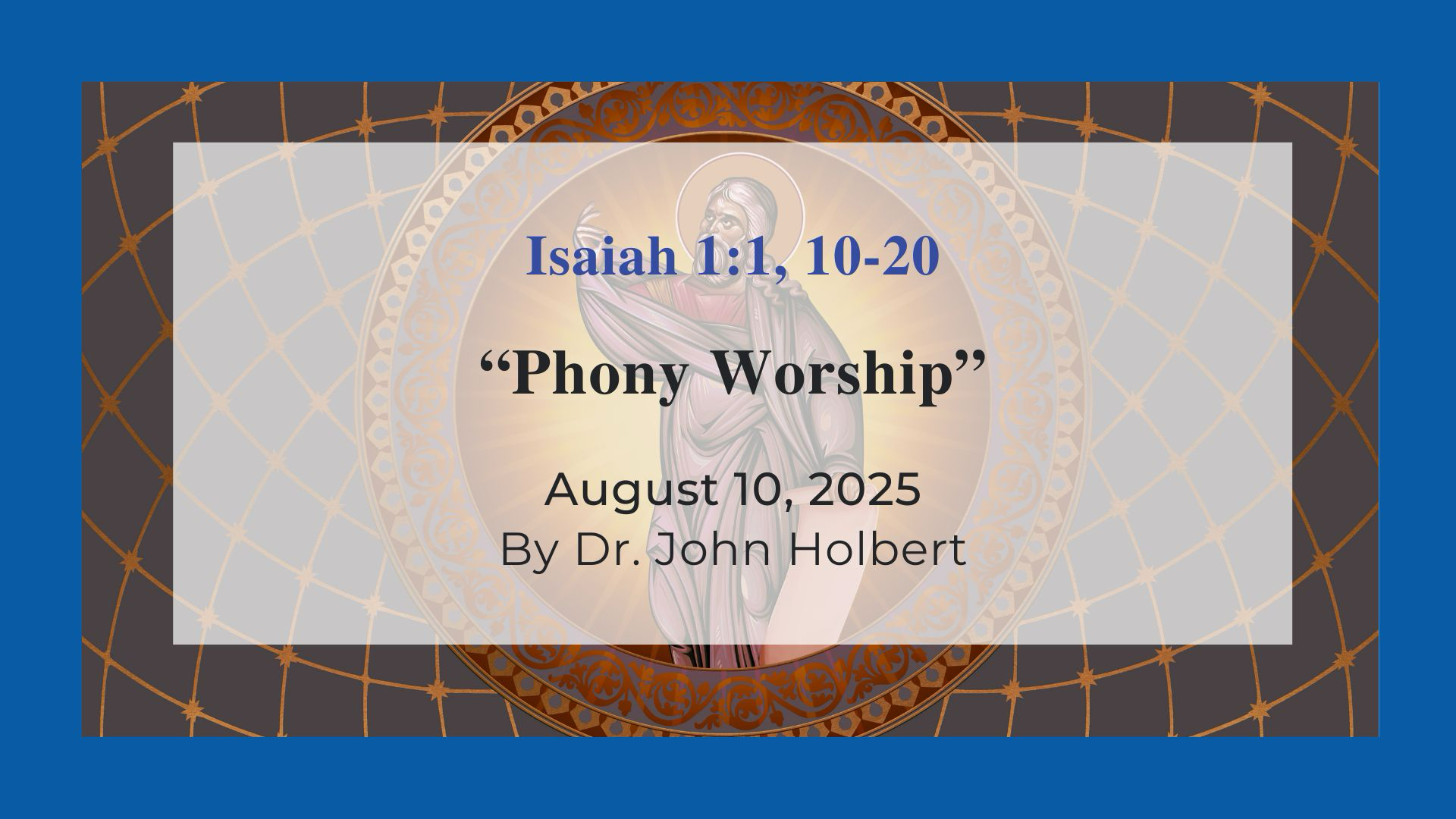Phony Worship - Reflections from Isaiah 1: 1, 10-20, Pentecost 9, Year C
by John C. Holbert on Wednesday, June 4, 2025

Each of the 8th century prophets of Israel and Judah— Amos, Hosea, Isaiah, and Micah—were especially concerned with the rank hypocrisy of the people of the two lands: Israel in the north and Judah in the south. The issue of hypocrisy revolves around the notion that one’s actions and words do not match the claims one overtly makes. This hypocrisy particularly involves the kinds of worship practiced by those people, in Bethel by the northern Israelites, and in Jerusalem by the southern Judeans. What these worshipers announce in their prayer, song, and sacrifice clearly are unrelated to, in fact are contradicted by, their actions in the community. The prophets reserve some of their harshest language for this liturgical hypocrisy, demonstrated so boldly in both sanctuaries. I have long found these passages to be among the most relatable ones to our own modern practices Sunday after Sunday. We always must ask: is what I am saying here on Sunday commensurate with my actions on Monday?
Isaiah found a decided disconnect between the great worship services in Jerusalem, during one of which he was called to prophesy (Is.6), and the actions of those same worshipers after they had departed the temple. He begins his initial oracle with portentous words: “Hear, you skies, pay attention, earth, because YHWH speaks:
“I birthed children and raised them up,
but they have rebelled against me” (Is.1:2)
Language like this was hardly expected nor easily heard by the worshipers in Jerusalem. What can Isaiah possibly mean by suggesting that we faithful ones in the temple have rebelled against the great YHWH? Are we not here today in the temple, experiencing superb liturgies, wonderful choirs, and the fabulous sacrifices of the well-regulated and trained priesthood? Indeed, it is my sheep that has found his way to the pyres of YHWH. It is my gifts that make possible the vestments and accoutrements of the sanctuary. I and my family for generations past have been the foundation of the worshiping community here. In no way that I can discern have we been rebellious against YHWH! Quite the opposite! YHWH surely finds in us a most faithful community, dedicated to the upholding of the excellent and meritorious celebration of YHWH’s power and love for YHWH’s chosen people. Just who does Isaiah think he is, saying such foolishness?
Isaiah then adds to his opening blasts against the people the ideas that they are “a sinful nation, burdened with iniquity,” who have birthed “offspring that do evil, children who are corrupt, who have abandoned YHWH” (Is.1:4). “Your land is annihilated, your cities burned with fire. Right before your eyes, enemies devour your land” (Is.1:7). Isaiah’s observation concerning Jerusalem may be actual destruction, though that does not occur until nearly two centuries after his time. The more likely possibility is that he is warning Jerusalem that their destruction is not far off, since during Isaiah’s lifetime the Assyrians destroyed Samaria, capital city of the north, and threatened Jerusalem not long after. It appears that the comfortable worshipers in the temple are unaware of just what grave danger they are in.
If they imagine that YHWH is pleased with their elaborate worship, they are completely wrong. Just listen to the ways Isaiah excoriates what the Judeans feel is so wonderful.
“Why are your multiple sacrifices to me so grand?
I am sated with burnt sacrifices of rams,
and the fat of fattened beasts!
I take no pleasure in the blood of bulls, or lambs, or goats.
When you come to gaze at my face, who asked this of you?
Trample my sanctuary no more!
Stop bringing these evil gifts;
incense is abominable to me!
Your monthly new moon festivals I detest;
I can no longer abide your evil solemn gatherings.
When you stretch out your hands, I will hide my eyes;
when you pray and pray, I will not listen!
your hands are full of blood!” (Is. 1:11-13a, 14-15)
Isaiah here excoriates the entire worship apparatus of Jerusalem’s temple; its sacrifices, its prayers, its festivals, all are useless in the sight of YHWH, precisely because the peoples’ “hands are filled with blood.” Exactly what does the prophet mean?
“Wash yourselves; come clean.
Remove the evil of your actions from my eyes!
Stop the evil! Learn the good! Search for justice:
rescue the oppressed.
Defend the orphan; go to court for the widow” (Is.1:16-17).
Finally, Isaiah makes plain just what evil is in Jerusalem; it is the basic lack of justice, the inequity of the community. When orphan and widow find no support, those elements of society who can find no natural access to the goods and services of their community, that community has lost its way and has become nothing less than an abomination in YHWH’s sight. And, Isaiah says, no amount of worship, no matter how beautiful, no matter how well-planned, no matter how magnificently executed, can cover over the evil that pervades every fiber of an unjust society. In such a place worship becomes little more than a smokescreen for evil. Isaiah does not call here for a cleaned-up worship; he calls rather for a cleaned-up society. And, I would agree; worship without justice is finally no worship at all.
